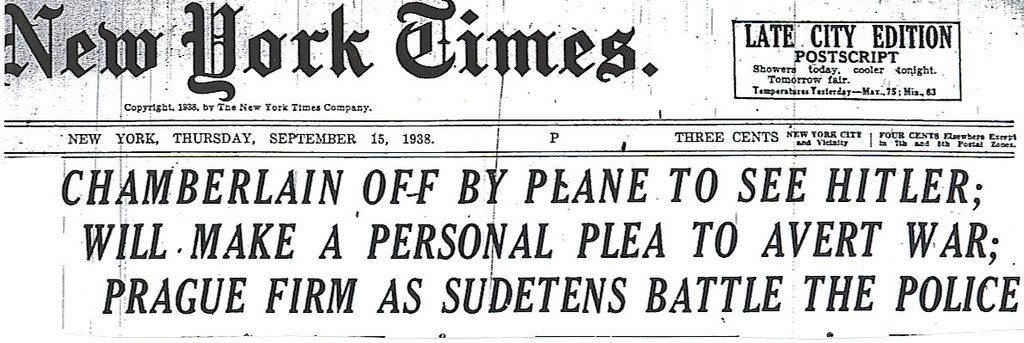
Posted on 09/15/2008 5:15:58 AM PDT by Homer_J_Simpson

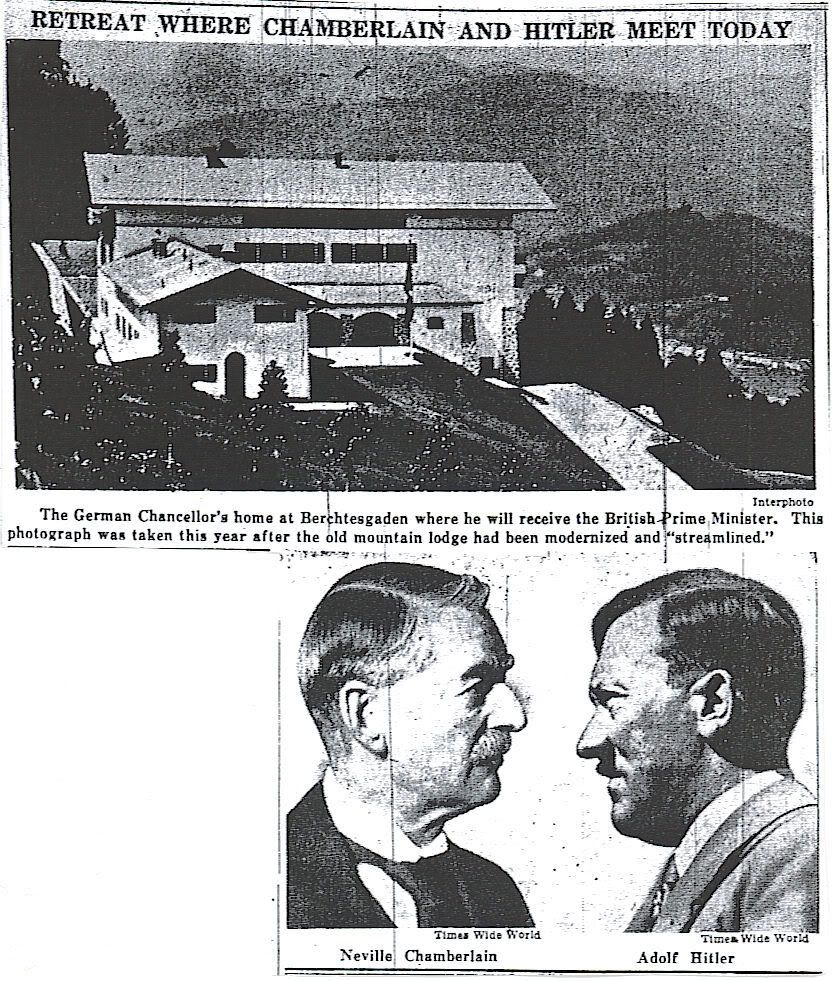
Prime Minister Chamberlain, in a dramatic move to avert Europe’s threatened war, is flying to Germany to meet Chancellor Hitler face to face.. The step, which was approved by the full British Cabinet yesterday, was understood to have been suggested by Premier Daladier of France. It electrified Germany, where Hitler conferred all day with his diplomatic advisers.
This development came after a day of continued violence in the Sudeten areas of Czechoslovakia. In the border town of Schwaderbach Henleinists seized the police station and for hours held the Czech forces at bay. Prague charged that they were helped by arms from abroad. In Eger six were killed in a police attack on Henleinist headquarters.
Meanwhile Konrad Henlein said events had left his original demands far behind and he balked at further negotiations.
As a solution to the Sudeten German problem a letter published in Italy, attributed to Premier Mussolini called on Viscount Runciman, British mediator, to sponsor a plebiscite.
At Geneva preparations were made to convene the League Council immediately after any German invasion of Czechoslovakia.
A Tokyo statement that Japan would support her anti-Communist allies, Germany and Italy, with arms if necessary, caused alarm in foreign circles in China because of the peril to huge foreign interests there.
While Washington took hope from the Chamberlain development, American tourists tin Germany were advised as a precautionary measure to leave the country.
Locally, the stock market again was hit by a wave of selling, and underwriters suspended rates on marine insurance, with higher ones likely to be fixed today.
At 8:36 A. M. the wheels of the big silver Lockheed monoplane lifted from the runway into a cloudless sky. Its first stop will be Munich, 600 miles away, whence Mr. Chamberlain will go to Hitler’s mountain chalet by automobile.
He made a statement for the newsreels as follows:
“I am going to meet the German Chancellor because the situation seems to me to be one in which discussions between me and him would be fruitful. My policy has always been to seek peace. The Fuehrer’s ready acceptance of my invitation leads me to hope my visit will not be without result.”
Only about 100 newspapermen, photographers and officials were allowed near the airplane. They cheered and shouted, “Good luck! God speed you!”
A moment later Mr. Chamberlain turned and bowed his head to enter the plane. But photographers called him back and then the Prime Minister found time to joke. He struck a stiff attitude, his hands on his hips, like an old-fashioned daguerreotype.
The crowd gasped and then gave three cheers, waving hats. The individual cries redoubled and Mr. Chamberlain’s face broke into a surprised smile and he waved his own hat. Within five minutes after the engines had been warmed up
his plane rose gracefully and almost in a moment was a dim spot on the southern horizon.
Looking vigorous and confident the Prime Minister had left No. 10 Downing Street at 7:50 A. M. He was traveling light for his valet placed only two suitcases in the limousine that took him to the airport.
He made a smiling figure as he stood posing for camera men. He even murmured a few words for the benefit of a newsreel.
A squad of more than thirty policemen had cleared Downing Street of all except newspaper men and photographers. A crowd of early risers, however, had congregated in Whitehall and sent up a cheer as the Prime Minister’s car went by. His expression was inscrutable as he drove past the Cenotaph.
After another day of acute tension, with reports of unusual military activity in Germany, Downing Street announced last night that a meeting of the Prime Minister and the Fuehrer would take place at Berchtesgaden. This was the official statement:
The Prime Minister has sent the German Fuehrer and Chancellor, through His Majesty’s Ambassador to Berlin, the following message:
“In view of the increasingly critical situation, I propose to come over at once to see you with the view to trying to find a peaceful solution. I propose to come across by air and am ready to start tomorrow. Please indicate the earliest time at which you can see me and suggest a place of meeting. I should be grateful for a very early reply.
“NEVILLE CHAMBERLAIN.”
The Fuehrer and Chancellor has replied to the above message that he would be very ready to meet the British Prime Minister on Sept. 15 (tomorrow). The Prime Minister is, accordingly, leaving for Germany by air tomorrow.
He is taking with him Sir Horace Wilson, his closest and most trusted adviser, and William Strang, chief of the Central European Department of the Foreign Office, who will be the interpreter during the interview.
The news of the Prime Minister’s trip left Chancelleries all over Europe gasping with astonishment and took the British people’s breath away. Nothing so daring or dramatic had been done in the annals of British diplomacy. There was no exact precedent for it.
Mr. Chamberlain simply cut through diplomatic formalities in the hope that personal contact might spare Europe the horrors of another world war. Whether it would succeed, Mr. Chamberlain himself would not dare say.
Crowds in Whitehall cheered him as the news of his visit spread. The public imagination was stirred as never before by the thought of a gouty man of almost 70 years flying off to Bavaria for a face-to-face talk with the dictator of Germany. Whatever the outcome may be, Mr. Chamberlain’s decision was the most popular of his career.
The decision was taken against a background of steadily deepening anxiety over the Central European situation. Every report that came from Prague or Berlin yesterday contributed to the belief that Europe, including Great Britain, was headed straight for war unless drastic and unconventional measures were found.
King George decided to hurry back from Balmoral and traveled south by train last night to discuss the international situation with his Ministers.
At Westminster Abbey the nave around the grave of the Unknown Warrior was ordered set aside for unbroken intercession prayers from today until Sunday.
The Cabinet met for two and an half hours yesterday morning while police cordons kept the quiet grave-faced crowd from pushing into narrow Downing Street. Further military, naval and air precautions were discussed, but for the first time the Ministers had a depressing sense of helplessness as they studied the European outlook.
The choice seemed to lie between going to war or acquiescing in a German conquest of Czechoslovakia with all it might involve. There still were a few cards left to play in Prague and Berlin, but British diplomacy seemed to have come close to the end of the road of peace.
In this atmosphere Mr. Chamberlain told his colleagues of his decision to go to Germany. On Tuesday he had a telephone call from Premier Edouard Daladier of France who urged that some “exceptional” move be made to get in direct touch with the leader of Nazi Germany.
The idea of a personal meeting with Hitler had been in Mr. Chamberlain’s mind for a long time as a last resort in case of emergency. He has always favored a direct personal approach rather than the formalities of diplomatic procedure. With a real emergency at hand, Mr. Chamberlain’s mind was made up and his colleagues agreed.
Joseph P. Kennedy, the United States Ambassador, was told while the Cabinet meeting was still going on. Jan Masaryk, the Czechoslovak Minister, was informed during the afternoon when acceptance of the proposal for a talk came form Berlin. But not a word or hint of Mr. Chamberlain’s intention was allowed to leak out until 9 o’clock at night, when the announcement from Downing Street electrified the country.
It is said Mr. Chamberlain leaned back in his big armchair at the cabinet table and asked quietly what his colleagues thought of the idea. At first there was incredulous silence in the historic room. Then one by one, they agreed and voiced their admiration of Mr. Chamberlain’s courage.
The Prime Minister, according to this story, ended the discussion with a smile and the remark, “Well, I take it it is agreed?”
The opposition leaders, Clement R. Attlee for Labor and Sir Archibald Sinclair for the Liberals, visited Downing Street last night and were said to have expressed their complete approval of Mr. Chamberlain’s visit.
The result at Berchtesgaden probably will not be palatable to the Czechs, who were not consulted in advance about Mr. Chamberlain’s trip. But it was stated in quarters close to Downing Street that the Prime Minister is not taking any cut-and-dried scheme in his pocket.
He believes he can get an agreement in principle, which may bring at least a truce if not a permanent settlement. Without such confidence he would hardly have embarked on such a daring journey.
Moreover, Mr. Chamberlain is a tougher negotiator than Sir John Simon, who failed to make the slightest impression on Hitler in 1935, or Viscount Halifax, who visited Berchtesgaden without much success last year. Unless Hitler tries to deliver an impassioned monologue, as on former occasions, Mr. Chamberlain will be able at least to repeat previous British warnings against trying to settle the Sudeten problem by violence.
One of the motives of his mission, in fact, is to convince Hitler that Britain and France are in earnest against the use of force. But it remains to be seen in what mood Hitler will be today and what effect each of the two leaders will have upon the other.
Mr. Chamberlain and his advisers know there are many risks in the journey to Berchtesgaden, not the least of which is the probable impression abroad that Britain is courting Hitler because of weakness. The British contention, however, is that the British Empire is strong enough not to let any considerations of pride or prestige stand in the way of settlement.
It will also be said the Mr. Chamberlain is wrong to give a dictator such an ostentatious handshake, especially at a moment when the dictator is stirring up tension and hatred in the heart of Europe. But Mr. Chamberlain has always believed that the dictatorships and democracies must learn to live side by side and for once his approach to a dictator is not resented in his own country.
There are glittering prizes at the end of today’s journey and Mr. Chamberlain knows it. He stands to win two ways. If he should bring back even a temporary agreement from Berchtesgaden he may be acclaimed as the greatest hero of British diplomacy since Disraeli brought back “peace with honor” from the Congress of Berlin sixty years ago.
If, on the other hand, Hitler refuses all concessions and sends Mr. Chamberlain away empty handed it may turn out to be a victory for the Prime minister for it will enable Mr. Chamberlain to lead a 100-per cent-united nation into war against Germany, and not only a united nation, but a united empire and perhaps other nations as well.
Even if he fails at Berchtesgaden Mr. Chamberlain can say to Britain, to the Dominions, and even to the United States:
“I have done everything humanly possible to keep peace.”
Last night as crowds in Whitehall shouted, “Good old Chamberlain!” little groups of men and women could be seen fingering the wreaths on the Cenotaph, commemorating the millions who fell in the last war.
In all Free Churches of England and Wales the congregations were urged last night to join in prayer “for the blessing of God upon the Prime Minister’s journey to Germany.”
“I am going to pray for you,” a friend told Mr. Chamberlain last night.
“I wish you would – I need it,” was the answer.
Banner headlines – The Times went so far so to give a two-column display in bold face to the text of Mr. Chamberlain’s telegram to Hitler – told the British public of the Prime Minister’s “supreme bid for peace.” The news of his flight, however, probably had already reached most Britons over the radio.
All newspapers warmly approved Mr. Chamberlain’s decision.
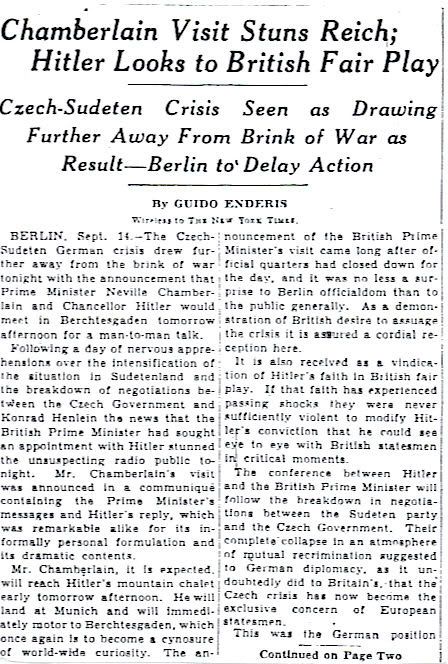
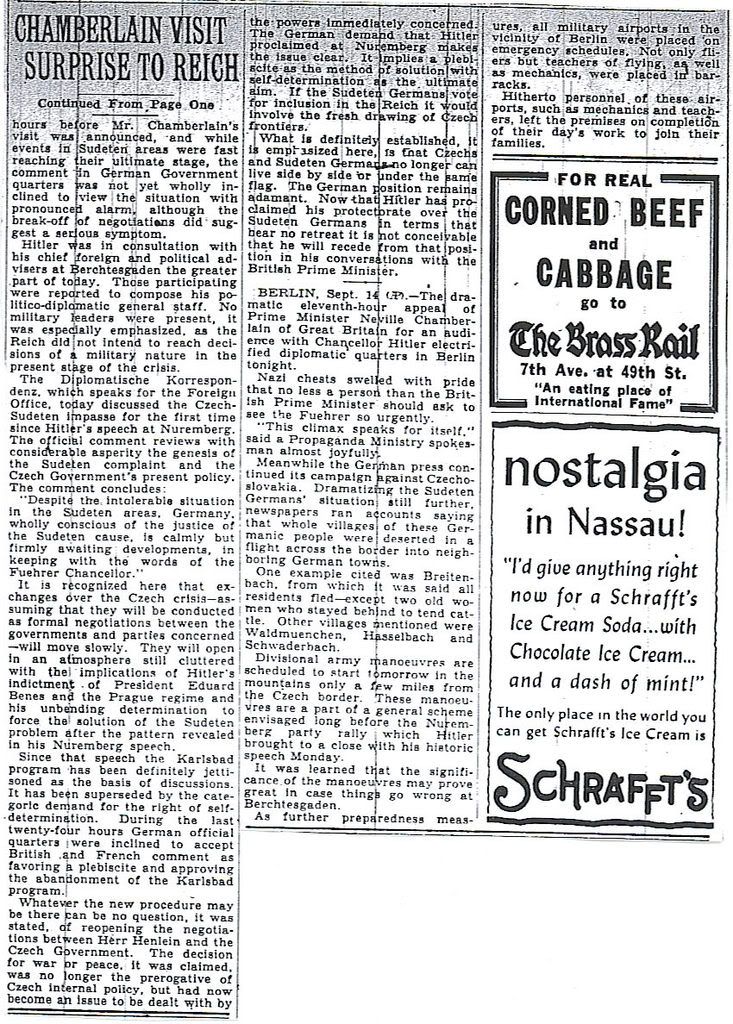
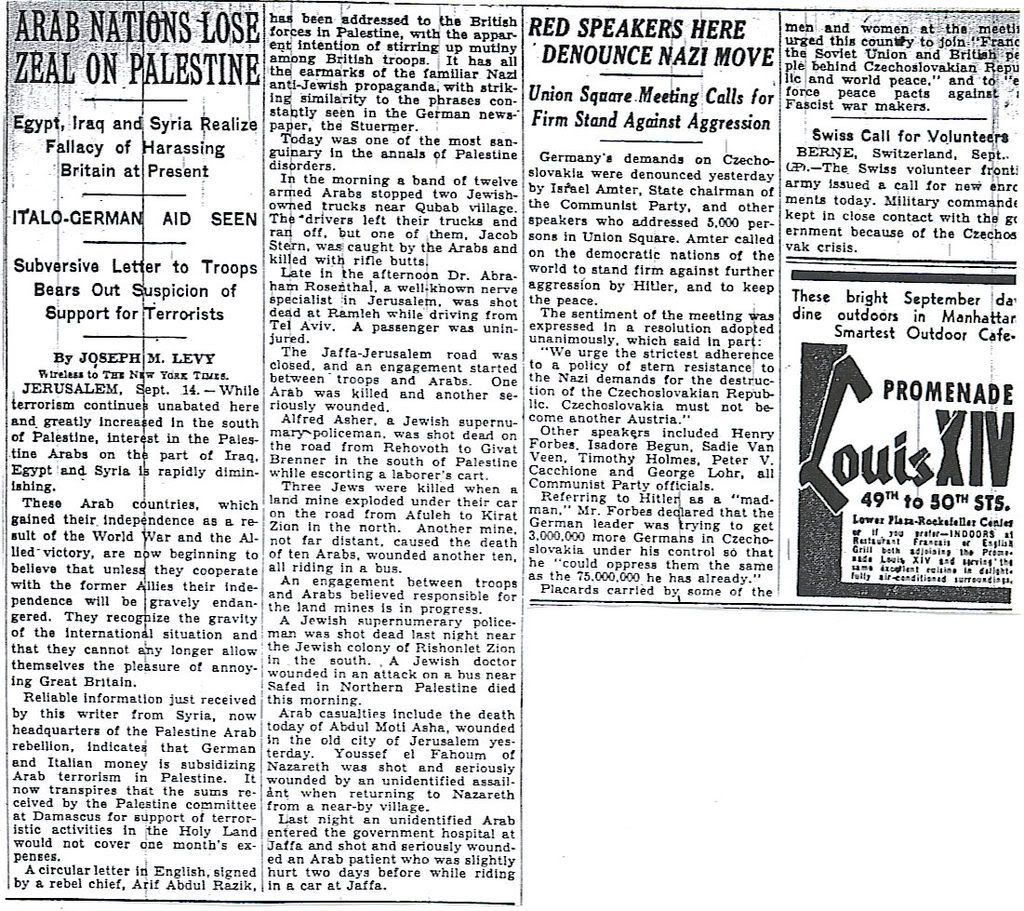
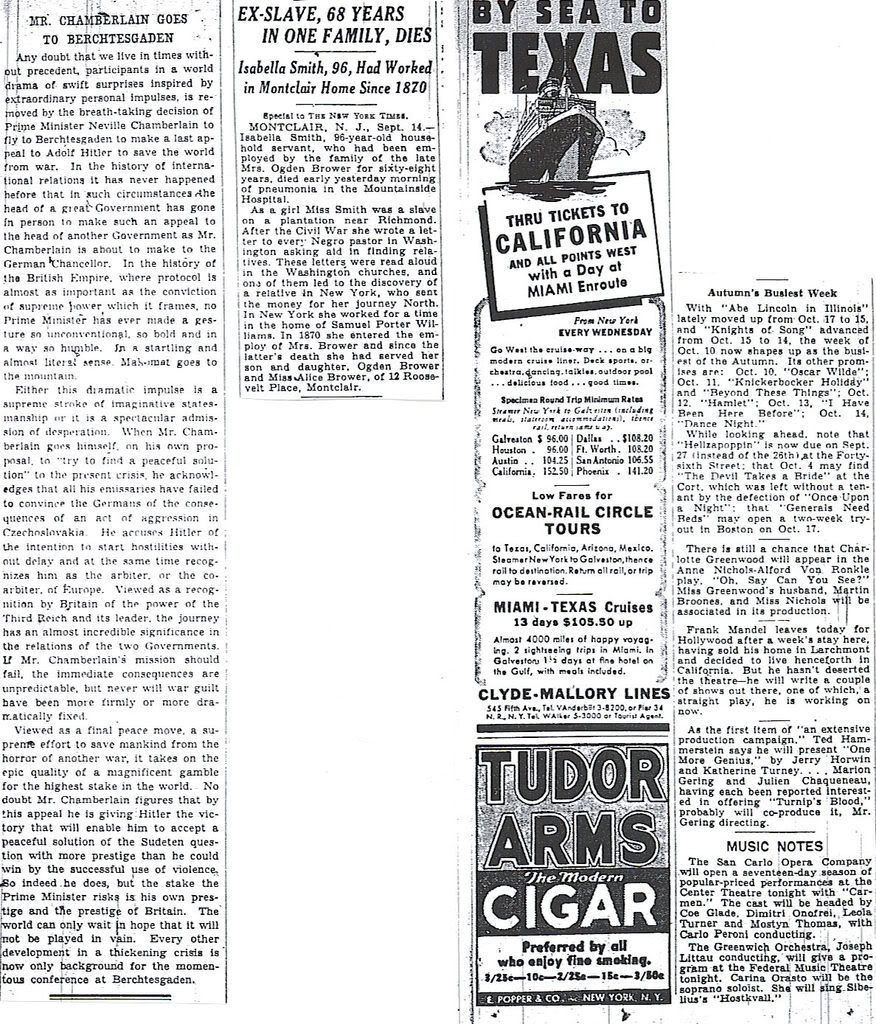
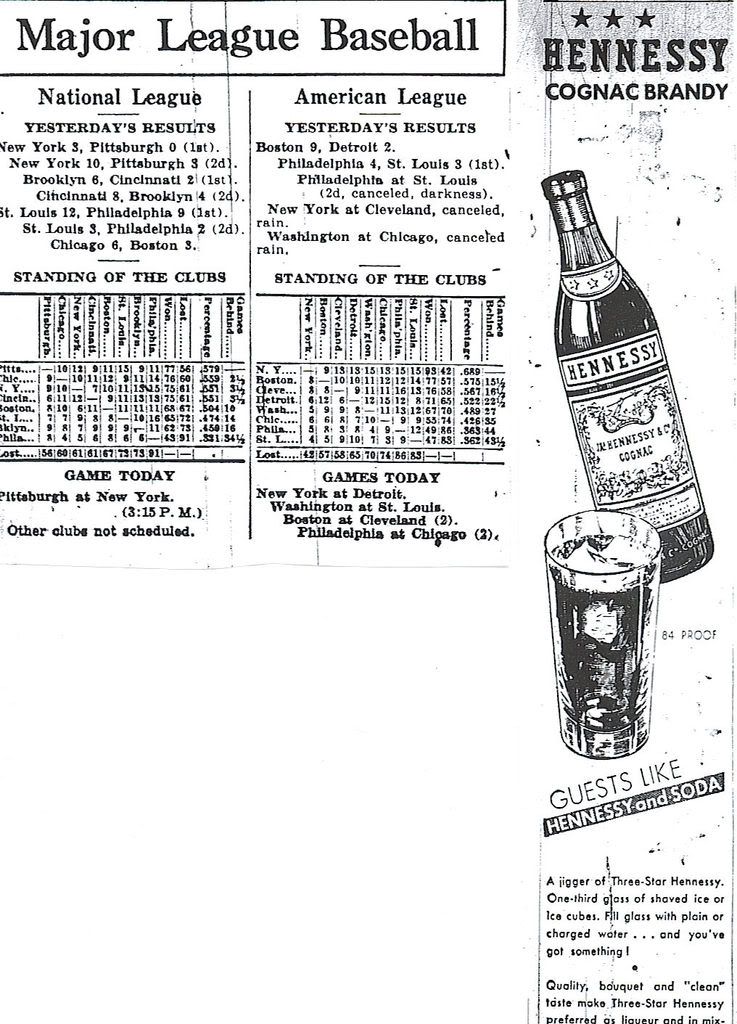
Chamberlain was just doing what Barry Obama said he will do...negotiate with enemies. And we know how well that worked out in 1938.
“Those who are ignorant of history are bound to repeat it.”
After the lead story (with photos) there is a second page 1 story about the Chamberlain visit, and a page 7 article. Then I posted an obituary. I never did this before but this one caught my eye. Finally, the standings. The Cubs are moving up. Could this be their year?
“Britain and France had to choose between war and dishounor. They chose dishonour. They will have war.”
Winston Churchill
"Good heavens!" ("Ich bin vom Himmel gefallen!") Hitler exclaimed when he read Chamberlain's message. He was astounded but highly pleased that the man who presided over the destinies of the mighty British Empire should come pleading to him, and flattered that a man who was sixty-nine years old and had never traveled in an airplane before should make the long seven hours' flight to Berchtesgaden at the farthest extremity of Germany. Hitler had not had even the grace to suggest a meeting place on the Rhine, which would have shortened the trip by half.
Whatever the enthusiasm of the English, who seemed to believe that the Prime Minister was making the long journey to do what Mr. Asquith and Sir Edward Grey had failed to do in 1914—warn Germany that any aggression against a small power would bring not only France but Britain into war against it—Hitler realized, as the confidential German papers and subsequent events make clear, that Chamberlain's action was a godsend to him. Already apprised by the German Embassy in London that the British leader was prepared to advocate "far-reaching German proposals," the Fuehrer felt fairly certain that Chamberlain's visit was a further assurance that, as he had believed all along, Britain and France would not intervene on behalf of Czechoslovakia. The Prime Minister had not been with him more than an hour or so before this estimate of the situation became a certainty.
In the beginning there was a diplomatic skirmish, though Hitler, as was his custom, did most of the talking. Chamberlain had landed at the Munich airport at noon on September 15, driven in an open car to the railroad station and there boarded a special train for the three-hour rail journey to Berchtesgaden. He did not fail to notice train after train of German troops and artillery passing on the opposite track. Hitler did not meet his train at Berchtesgaden, but waited on the top steps of the Berghof to greet his distinguished visitor. It had begun to rain, Dr. Schmidt, the German interpreter, later remembered, the sky darkened and clouds hid the mountains. It was now 4 P.M. and Chamberlain had been on his way since dawn.
After tea Hitler and Chamberlain mounted the steps to Hitler's study on the second floor, the very room where the dictator had received Schuschnigg seven months before. At the urging of Ambassador Henderson, Ribbentrop was left out of the conversation, an exclusion which so irritated the vain Foreign Minister that the next day he refused to give Schmidt's notes on the conference to the Prime Minister—a singular but typical discourtesy—and Chamberlain thereafter was forced to rely on his memory of what he and Hitler had said. Hitler began the conversation, as he did his speeches, with a long harangue about all that he had done for the German people, for peace, and for an Anglo-German rapprochement. There was now one problem he was determined to solve "one way or another." The three million Germans in Czechoslovakia must "return" to the Reich.
He did not wish [as Schmidt's official account puts it] that any doubts should arise as to his absolute determination not to tolerate any longer that a small, second-rate country should treat the mighty thousand-year-old German Reich as something inferior . . . He was forty-nine years old, and if Germany were to become involved in a world war over the Czechoslovak question, he wished to lead his country through the crisis in the full strength of manhood . . . He would, of course, be sorry if a world war should result from this problem. This danger, however, was incapable of making him falter in his determination . . . He would face any war, even a world war, for this. The rest of the world might do what it liked. He would not yield one single step.
Chamberlain, who had scarcely been able to get a word in, was a man of immense patience, but there were limits to it. At this juncture he interrupted to say, "If the Fuehrer is determined to settle this matter by force without waiting even for a discussion between ourselves, why did he let me come? I have wasted my time." The German dictator was not accustomed to such an interruption— no German at this date would dare to make one—and Chamberlain's retort appears to have had its effect. Hitler calmed down. He thought they could go "into the question whether perhaps a peaceful settlement was still possible after all" And then he sprang his proposal.
Would Britain agree to a secession of the Sudeten region, or would she not? ... A secession on the basis of the right of self-determination?
The proposal did not shock Chamberlain. Indeed, he expressed satisfaction that they "had now got down to the crux of the matter." According to Chamberlain's own account, from memory, he replied that he could not commit himself until he had consulted his cabinet and the French. According to Schmidt's version, taken from his own shorthand notes made while he was interpreting, Chamberlain did say that, but added that "he could state personally that he recognized the principle of the detachment of the Sudeten areas . . . He wished to return to England to report to the Government and secure their approval of his personal attitude."
From this surrender at Berchtesgaden, all else ensued.
That it came as no surprise to the Germans is obvious. At the very moment of the Berchtesgaden meeting Henlein was penning a secret letter to Hitler from Eger, dated September 15, just before he fled across the border to Germany:
MY FUEHRER: I informed the British [Runciman] delegation yesterday that the basis for further negotiations could . . . only be the achievement of a union with the Reich.
It is probable that Chamberlain will propose such a union.
William L. Shirer, The Rise and Fall of the Third Reich, Pg. 384-386
Nice addition to the thread. It’s a little premature, though. Maybe you could repost it on 10/1.
"Hitler had for some time been convinced that neither France nor Britain would fight for Czechoslovakia. On May 28 he called a meeting of his principal advisers and gave instructions for the preparations to attack Czechoslovakia.
"His service advisers, however did not share unanimously his overwhelming confidence. The German generals could not be persuaded, considering the still enormous preponderance of Allied strength except in the air, that France and Britain would submit to the Fuehrer's challenge.
"To break the Czech Army and pierce or turn the Bohemian fortress line would require practically the whole of thirty-five divisions. The German Chiefs of Staff informed Hitler that the Czech Army must be considered efficient and up to date in arms and equipment.
"The fortifications of the West Wall or Siegfried Line, though already in existence as field works, were far from completed: and at the moment of attacking the Czechs only five effective and eight Reserve divisions would be available to protect the whole of Germany's western frontier against the French Army, which could mobilize a hundred divisions.
"The generals were aghast at running such risks, when by waiting a few years the German Army would again be master."
On September 10, the French foreign minister, M. Bonnet, asks the British ambassador in Paris: what if Hitler invades Czechoslovakia? The formal British government response of September 12 is noncommittal:
"...So far therefore as I am in a position to give any answer at this stage to M. Bonnet's question, it would have to be that while His majesty's Government would never allow the security of France to be threatened, they are unable to make precise statements..." etc., etc.
Writes Churchill:
"Upon the statement that "His Majesty's Government would never allow the security of France to be threatened" the French asked what aid they could expect if it were. The reply from London was, according to Bonnet, two divisions, not motorized, and one hundred and fifty aeroplanes during the first six months of the war.
"If M. Bonnet was seeking for an excuse for leaving the Czechs to their fate, it must be admitted that his search had met with some success."
Thanks, Bro. I need to tackle Churchill's history. I have heard it is a bit self-serving, but man, what an eyewitness! And from your post I see he cites specific dates. That is useful for my sinister purposes
No doubt, but I've just finished Pat Buchanan's new book, "The Unnecessary War," where Buchanan chases after the Old Man with two-by-four, just whacking Churchill upside the head, EVERY chance he gets.
So I thought, how about giving the Old Man a chance to speak for himself, for a change? And, all things considered, I'd say he does pretty well... ;-)
Disclaimer: Opinions posted on Free Republic are those of the individual posters and do not necessarily represent the opinion of Free Republic or its management. All materials posted herein are protected by copyright law and the exemption for fair use of copyrighted works.